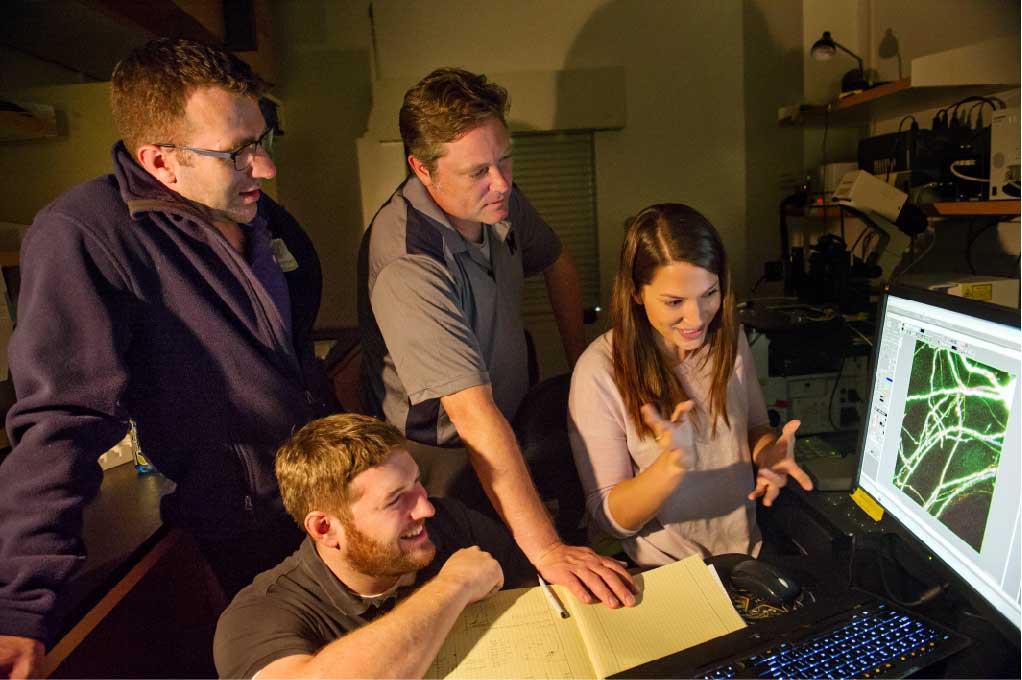Leading University of Michigan Neurology Professor Dr. Peter Todd predicts advanced Fragile X treatments are coming.

Dr. Peter Todd is a pragmatist.
Yes, he recognizes the emotional toll caused after several once-promising Fragile X syndrome (FXS) clinical trials fizzled over the past decade, leaving many affected families worldwide let down, bewildered and searching for answers. His pragmatism leads him to believe a FXS cure may be five to 10 years away. But he also believes this is a very exciting time for FRAXA-funded researchers and affected families.
“We are in a much more mature space these days,” said Dr. Todd, who was just endowed as the Chester and Anne Alecks Sackett Endowed Professor. He is also a Professor of Neurology and Associate Chair for Research, Department of Neurology, University of Michigan, Ann Arbor.
Moving Forward: Speeding Up the Quest for FXS Treatments
According to Dr. Todd, reasons for renewed hope are twofold: FXS researchers worldwide are in phase two and three clinical drug trials with more promising results than ever. Researchers better understand the FXS landscape and underlying pathology. They also are now much better at measuring the symptoms of Fragile X syndrome, and, as a result, there is an influx of top biological companies willing to invest millions of dollars to develop advanced treatments and eventually find a FXS cure.
“The recent trials will hopefully soon lead to effective drugs,” Dr. Todd said. “These new drugs have been shown to reduce anxiety and improve cognition. Finding advanced treatments is moving forward very quickly.”
Promoting Fragile X Research, Training, and Education
Dr. Todd co-directs the U-M Fragile X Syndrome Clinic, part of a consortium of 20+ FXS clinics around the world. His clinic is among the few in the world treating adults with FXS and will restart in July 2024, welcoming affected families. His co-director is Dr. Christine Sloane-Heggen, U-M Assistant Professor of Pediatric Genetics. Newly hired Genetic Counselor Jessica O’Shea will serve as the clinic coordinator.
Dr. Todd also manages the University of Michigan Peter K. Todd Lab to develop novel and effective therapeutics for patients with repeat expansion disorders, define how nucleotide repeats function normally and contribute to human disease, understand how RNA biology contributes to neuronal plasticity and dysfunction, and support the growth of future scientific leaders while having fun doing cutting-edge research.

“Our goals are to provide informed clinical care of Fragile X spectrum disorders, including Fragile X syndrome, Fragile X-associated Tremor/Ataxia Syndrome (FXTAS), and Fragile X-associated Primary Ovarian Insufficiency (FXPOI), and to promote research, education, and training,” he said.
Repeats Help Human Neurons Function
Dr. Todd’s research focuses on how FXS-causing repeats help human neurons function.
In a paper published recently in Nature Neuroscience and discussed in a related story, Dr. Todd served as a principal investigator of a study of how over half of genomes are made of repeating elements within DNA. In rare cases, these repeats can become unstable and grow in size. These repeat "expansions" cause neurodegenerative diseases such as ALS and dementia as well as learning disorders and autism in FXS.
Research to date has focused on how these expanded repeats cause disease, but little attention has been given to the repeats themselves and whether they might have normal functions in genes.
By focusing on the biology of healthy nerve cells, a Michigan Medicine team found that repeats in the gene that causes Fragile X syndrome normally regulate how and when proteins are made in neurons. This process may be important for learning and memory in these nerve cells and potentially in people.
“To develop a new treatment strategy, we really needed to understand the native biology of how these repeats work and why they are there in the first place,” Dr. Todd said. “The study was done on human neurons in a dish, and so there is still a long way before it can be tried in patients, but advancing our understanding of normal roles of the Fragile X gene in nerve cell biology is a crucial step towards finding a cure.”
Written by
Theodore Coutilish, MA
FRAXA Board Member
Theodore Coutilish a distinguished leader in marketing communications, serves as the Assistant Director of Strategic Engagement and Communications at the University of Michigan. Dedicated to advancing Fragile X research and awareness, he has long advocated for this cause, motivated by his son, Andrew, who has Fragile X syndrome. Residing in Grosse Pointe Shores, Michigan, with his wife, Mary Beth Langan, Theodore earned a BA in Print Journalism from Wayne State University and an MA in Communications from the University of Detroit Mercy.


